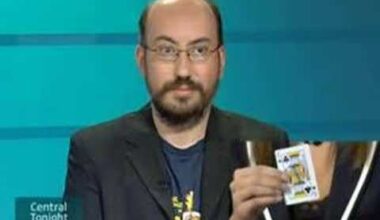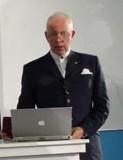Trying to get some additional help in improving his grades, German Memory Champion Boris Nikolai Konrad not only found some great assistance, but a change in career direction.
He starting researching mnemonic techniques in 2002 and was amazed at the increase in his memory after just a short time of practice. He learned about the competitive sports games and decided to give it a try. When he finished his Masters degree he decided the area of neuroscience was where he wanted to work.
I first heard about mnemonic techniques in 2002. I wanted to know more about them and if they might help me in school and later on in university. After a little bit of training I was amazed at how much I can improve my memory in some memory tasks and I heard about memory as a competitive sport and decided to give it a try. Since I was quite successful and highly enjoyed it, I kept competing. Over time I also started to look into memory research more and more. After I finished my Masters degree I started to look for a PhD position, knowing there was only one topic I really would like to work on.”
With a degree in physics and applied computer science, and minors in mathematics and business administration, Boris has the knowledge and expertise to back up his message.
Currently, Konrad is a neuroscientist, employed in the Neuroimaging lab at the world-renowned Max Planck Institute of Psychiatry in Munich, Germany. He is a keynote speaker and author, and world renowned as a memory trainer and expert on mnemonic techniques. In his spare time he is president of “MemoryXL”, the largest memory sports association in the world.
In 2009, Konrad set two world records at the Germany Memory Championships by memorizing 195 names and faces in 15 minutes, and 280 words. In 2010, he broke his own record by memorizing 201 names and faces.
Currently he is listed in the Guinness Book of World Records for memorizing 21 first names and birth dates within two minutes; and holds a world record for memorizing 114 random words in order within five minutes.
At the World Memory Championships events he won the World Championship as both an individual and part of a team in memorizing words and names.
Konrad uses mnemonics, and the method of loci, in his memorizing. He explains how the brain is able to enhance itself this way: So far the amount of research done on superior memorizers is rather limited, especially if compared to research on people with brain lesions or other deficits and how these affect memory. The brain is able to store more information if they come in in a specific way. Apparently the mnemonics enable us to directly encode information into long-term memory. Using visual imagery one can influence which memory system encodes particular information. This is very interesting when we think about the various roles of different memory systems in general and try to understand how they are connected.
When a reporter asked him what separates the champions from the rest of the competitors, Konrad said, The best memory athletes spend much more time on deliberate practice than the average competitor and a lot of training is a necessity for success in memory as well. One part of that is the number of images they have prepared.
While one can start memorizing numbers by having an image for each digit from 0 to 9,” he explains, “everyone at a competition will have at least 100 images for the numbers from 00 to 99. And the world-class competitors have 1000 images prepared for every number from 000 to 999 and often even 2704 different images for each combination of two playing cards for the disciplines based on them. The same thing is true for the locations used for the method of loci. An average competitor might have a few hundred locations while the top notch ones do have several thousands of them.
When asked if an above average IQ was necessary to compete and retain information at the competition level, Konrad stated that he himself took the MENSA test, and passed, but just barely. He added that, Over the last years we had a large number of memory athletes come to our lab in Munich at the Max Planck Institute of Psychiatry. We found that most of them had a pretty high IQ on standard tests. This does not answer the question whether IQ is a necessity to perform at world-class level in memory sports or if it is just because intelligent people are more likely to enjoy constantly challenging themselves in cognitive tasks. But it was quite apparent that nearly all of them had really high (>130) IQ scores.
Konrad believes that IQ affects both learning and level of memory performance, but scientific data has not yet proven that a high IQ is necessary to function at a high memory level, and is not the only factor in success of a memory champion. He believes that the most important factors are motivation, and the desire to challenge oneself.
Resources:
National Speakers Association: http://directory.espeakers.com/nsas/viewspeaker19777
Psychology Today: http://www.psychologytoday.com/blog/beautiful-minds/201207/interview-world-memory-champion-boris-nikolai-konrad




